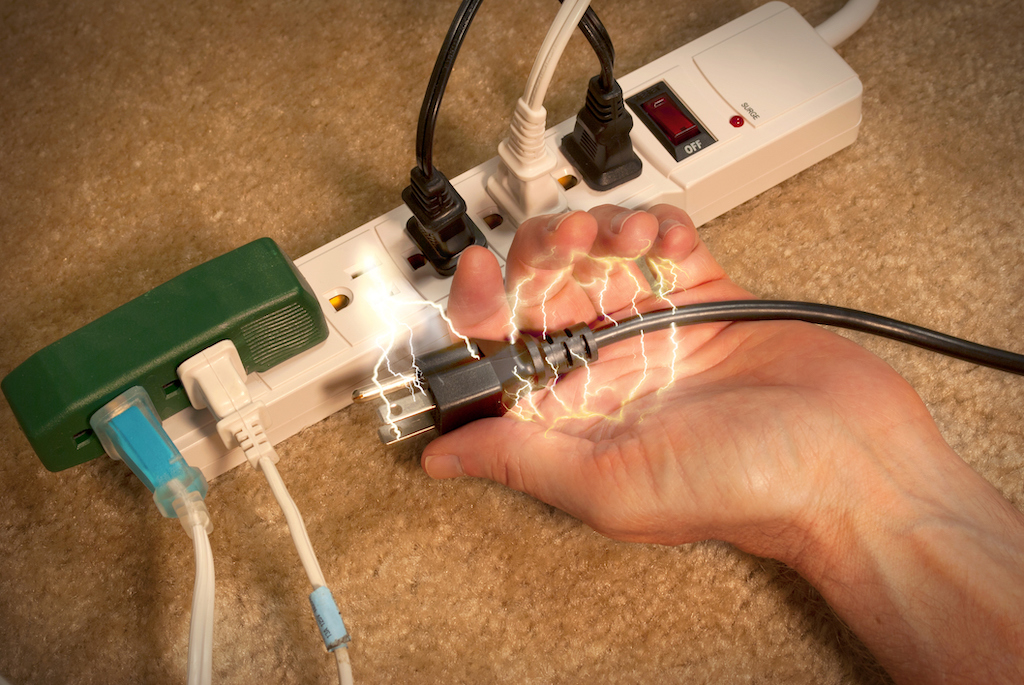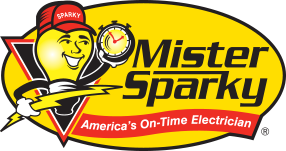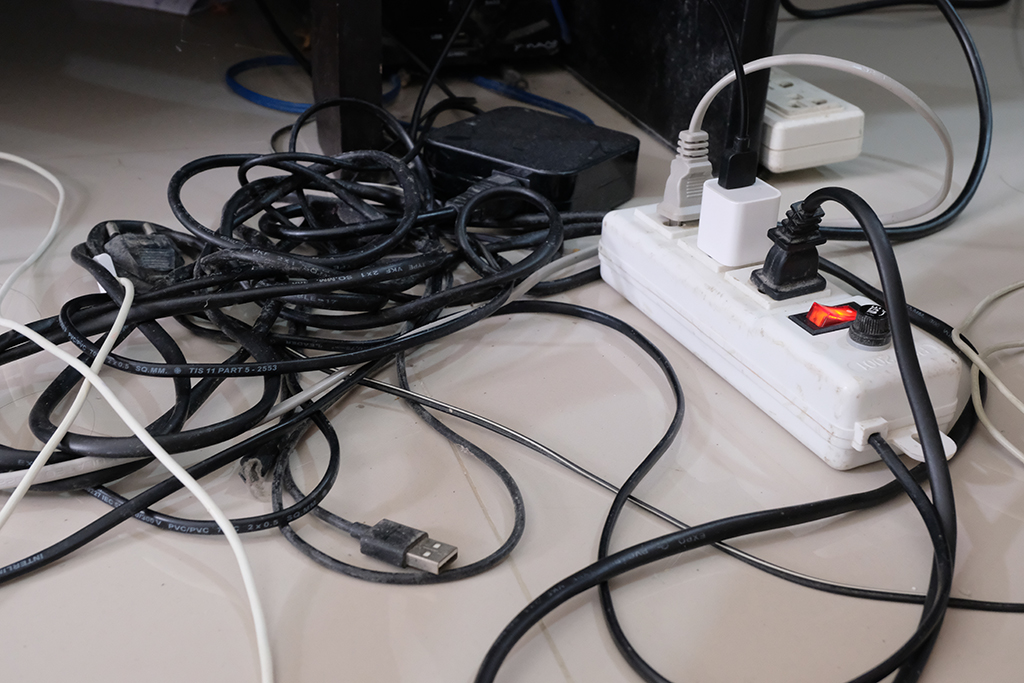Electrical Overloads: How To Prevent Issues In Your Home

Electrical overloads occur when too much current runs through your wires, which can cause overheating and even fires. To prevent this, regularly check your electrical systems, upgrade circuit breakers, and use surge protectors. Properly mapping circuits and using appliances safely is also important.
Understanding Electrical Overloads
Have you ever wondered how to stop electrical overloads in your home?
Electrical overloads happen when your circuits carry more electricity than they can handle.
This can cause overheating and even fire.
Overcurrent happens when electrical devices use more power than the wiring can safely manage.
This creates too much heat, which can damage equipment or start a fire.
Common causes of overcurrent include short circuits, too much load, bad design, arc faults, and ground faults.
Each of these can stress your home’s electrical system.
For example, plugging too many high-power devices into one outlet can cause an overload.
To prevent risks, homes have circuit breakers, fuses, and current limiters.
These devices automatically shut off power when they detect an overload to stop further damage.
But knowing and spotting the warning signs of an electrical overload is key for every homeowner.
Mister Sparky of Woodland Park, SC, offers services to help you understand and manage your home’s electrical system.
Staying on top of electrical maintenance keeps your home safe and your appliances working longer.
Common Causes of Electrical Overloads
Do you know that using too many electrical appliances can cause electrical overloads in your home?
This issue is common in Woodland Park, SC, but you can prevent it by knowing what leads to it.
Using too many appliances is a major cause.
Plugging too many devices into one circuit draws more current than the circuit can handle.
This isn’t just about having many gadgets connected; even one high-power appliance can cause an overload if the circuit is already busy.
Another cause is faulty wiring.
Old or worn-out wires, especially in older homes, can lead to short circuits.
These short circuits, along with too much load, are big reasons for electrical overloads.
If your home hasn’t had its wiring checked for a while, it could be a risk for electrical issues.
Also, circuit breaker problems can make things worse.
Circuit breakers protect your home by stopping too much current from flowing through a circuit.
They “trip” when they detect an overload.
If the breaker is faulty, it might not trip, letting too much current flow, which can cause fires or damage equipment.
By knowing these common causes and fixing them, you can keep your home safe from electrical overloads.
Warning Signs of Electrical Overloads
Noticed flickering lights or dips in your power supply?
These could be signs of electrical overloads in your home.
Woodland Park, SC residents, let’s look at some common warning signs Mister Sparky of Woodland Park, SC wants you to know.
First, flickering lights and power dips aren’t just annoying; they may mean your circuit is struggling to meet demand.
It’s like your home’s electrical system is waving a red flag, asking for help.
Another sign to watch for is warm or discolored outlets.
If an outlet feels warm, or you see discoloration or scorch marks, it’s a clear sign something is overheating.
This could be dangerous and needs immediate attention.
Lastly, if your circuit breakers keep tripping, you’re likely dealing with electrical overloads.
Circuit breakers are there to protect you by cutting off the current when there’s too much demand or a short circuit.
While it’s annoying when it happens a lot, it’s actually preventing a potential fire.
Being aware of these signs can save you a lot of trouble and keep your home safe.
If you spot any of these issues, act fast.
Ignoring them can lead to bigger problems later.
The Importance of Mapping Your Home’s Circuits
Have you ever thought about how to stop electrical overloads?
One key step is mapping your home’s circuits.
It may seem tricky, but it’s really important.
Steps to Map Your Home’s Electrical Circuits
Start by identifying and labeling each breaker in your panel. Turn off one breaker and see which outlets and lights lose power. Label each breaker and note its load capacity. This simple step can save you lots of headaches when troubleshooting or upgrading your system.
Benefits of Proper Circuit Mapping
Mapping your circuits helps you balance loads across different circuits.
This prevents electrical overloads, which happen when too much current flows through a wire.
Knowing which circuits power high-wattage appliances helps you avoid this risk.
Having a clear circuit map also helps you fix problems quickly.
Imagine finding the exact circuit causing issues and fixing it fast.
It also helps with regular maintenance and upgrades, so you don’t end up with a tangled mess of wires.
In short, mapping your circuits is an easy but valuable task.
It ensures safety and makes your system more efficient.
Ready to start? Mister Sparky of Woodland Park, SC can help you with it.
Calculating Your Home’s Circuit Loads
Ever wonder if your electrical system can handle your appliances?
Figuring out your home’s circuit loads can help stop electrical overloads and keep your home safe.
Here’s a simple guide to calculate electrical loads.
First, list all the devices and appliances you use.
Each has a wattage rating, found on a label or in the manual.
Add up the wattage for all devices on one circuit.
For example, if you have a fridge (600 watts), a microwave (1200 watts), and a toaster (800 watts) on the same circuit, the total load is 2600 watts.
To change wattage to amperage (since circuits are rated in amps), use the formula: Amps = Watts / Volts.
In most homes, the voltage is 120 volts.
So, for our example, 2600 watts / 120 volts = 21.67 amps.
If your circuit breaker is rated for 20 amps, you’re already over the limit, which could cause overcurrent and hazards.
Using tools like a digital multimeter or load calculators can give more accurate results.
Map out your home’s entire circuitry and consult pros like Mister Sparky of Woodland Park, SC for tough calculations.
Avoiding electrical overloads will keep your home safe, especially in Woodland Park, SC.
How to Prevent Electrical Overloads
Want to avoid electrical overloads in your home?
Regular maintenance checks are key.
Have professionals, like those at Mister Sparky of Woodland Park, SC, check your system often.
They can spot problems before they get big.
Look for faulty wiring and ensure appliances aren’t taking more power than circuits can handle.
Upgrading your circuit breakers is also a big help.
Newer circuit breakers can handle more load and offer better protection.
Many homes still have old breakers that may not be as safe.
Switching to newer ones can lower the risk of fires and equipment damage due to electrical overloads.
Consider using power strips with built-in fuses and current limiters.
These can protect your appliances and your home’s wiring from too much heat due to overcurrent.
These wise investments can keep your home’s electrical system working longer.
By taking these steps, you can avoid electrical fires and device failures, making your home safer from electrical overloads.
The Role of Surge Protection in Preventing Electrical Overloads
Wonder how to keep your home safe from power surges and electrical overloads?
Surge protection is your first step.
Here’s why it’s key for Woodland Park, SC folks.
Types of Surge Protection Devices
There are different surge protectors for different needs.
Point-of-use surge protectors, like those for your computers and TVs, guard your gadgets.
Whole-house surge protectors are set up at your service panel for full-home protection.
For the best safety, use both types to cover your entire home.
Installation of Surge Protectors
Installing surge protectors isn’t just a quick job.
It needs professional installation.
At Mister Sparky of Florence, SC, our pros make sure your surge protectors can handle your home’s electric needs.
Proper installation means you won’t have to worry about power spikes damaging your appliances or worse, causing electrical overloads and fires.
In short, using surge protection is smart for keeping your electric system safe.
Doing these simple steps keeps your home safe and your devices secure, so you can avoid hazards from electrical overloads.
Don’t take chances—call Mister Sparky of Florence, SC today!
Safe Use of Electrical Appliances
Do you know the best ways to use high-power appliances at home?
Safe handling of electrical appliances is key to keeping your home in Woodland Park, SC safe.
Dos and Don’ts of Using High-Power Appliances
Do:
- Use separate circuits: Plug things like fridges, washing machines, and microwaves into their own circuits. This spreads the load and cuts the risk of electrical overloads.
- Follow manufacturer guidelines: Stick to the instructions and maintenance tips from manufacturers to keep appliances running well and avoid electrical overloads.
Don’t:
- Do not use extension cords or multi-outlet converters for big appliances. They can overload a single socket, causing it to overheat or even start a fire.
Avoiding the Use of Extension Cords and Multi-Outlet Converters
While these might seem handy, they aren’t good for heavy or long-term use:
- Not made for high-power: These devices can’t handle the constant load that big appliances need.
- Overheating risks: Using them too long can lead to overheating, appliance damage, or even fires.
By following these tips, you can lower the risk of electrical overloads and keep your appliances safe.
For expert advice and help, trust Mister Sparky of Florence, SC to service homes in Woodland Park.
What to Do in Case of an Electrical Overload
Have you ever faced unexpected Electrical Overloads at home?
First, don’t panic.
Acting fast and correctly can prevent more damage and keep you safe.
Start by immediately shutting off the appliances affected.
This stops the extra current flow, reducing the risk of overheating and fire.
Find which appliance was last used before the overload, and unplug it right away.
Next, turn off your main power.
Find your home’s electrical panel and flip the main breaker to “off.”
This cuts off the power, stopping potential damage to other appliances and wiring.
Make sure everyone in your home knows the power is off to avoid accidents.
After the immediate threat is handled, check the situation.
Look for signs of damage, like scorched outlets or the smell of burnt plastic.
If you see serious issues, call a professional electrician.
Mister Sparky of Florence, serving Woodland Park, SC, can offer the expert help you need.
Remember, never try complex electrical repairs yourself.
Mistakes can make things even more dangerous.
Sometimes, a full electrical check-up might be needed to stop future Electrical Overloads, keeping your home safe.
When to Call a Pro Electrician
Not sure when to call a pro electrician for electrical overloads?
Some issues might be minor, but certain signs mean you need help.
Frequent circuit breaker trips or warm, discolored outlets are big warnings.
Persistent flickering lights and frequent power dips are also red flags.
If you live in Woodland Park, SC, you should keep your home’s electrical system safe.
That’s where Mister Sparky of Florence, SC, comes in.
Choosing a trusted electrician isn’t just about fixing the current problem—it’s about future peace of mind.
Look for licensed pros with good online reviews and a range of services.
Asking neighbors and friends for recommendations can also help.
Trying to fix electrical issues without the right know-how and tools can be dangerous, leading to fire risks.
Focus on safety and call a pro when signs suggest a deeper issue.
Mister Sparky of Florence, SC, is ready to find and fix electrical overloads fast, keeping your home safe and sound.
Long-Term Electrical Safety Solutions
Our homes rely on electricity, so it’s essential to keep them safe.
Ever wondered how to avoid electrical overloads? Here are some ways to do it:
Regular Electrical Maintenance
Be proactive. Have professionals like Mister Sparky of Woodland Park, SC check your electrical system regularly. This can catch wiring issues and other risks early. Fixing small problems now prevents big disasters later.
Why Regular Inspections Matter
Why check your system often? First, it keeps your wiring up-to-date and reduces fire risks. Second, it spots faulty breakers and electrical overloads that need fixing. Third, it helps homeowners stay insurance compliant, which is important for claims. Also, regular checks make your electrical system and appliances last longer and work better.
In short, investing in regular electrical maintenance and inspections can make your home much safer.
Contact Mister Sparky of Woodland Park, SC today to start your electrical maintenance plan and ensure peace of mind.
FAQs
- What are the most common signs of electrical overloads in a home?
Look out for flickering lights, circuit breakers that trip a lot, and warm or discolored outlets. These signs indicate that your electrical system is under stress and could potentially cause a fire. If you see any of these, get a professional to check your electrical system.
- How can I prevent electrical overloads in my house?
Regular maintenance checks are essential for identifying potential issues before they become serious. Avoid overloading outlets with multiple high-power appliances, and consider installing surge protectors to safeguard your devices and electrical system from sudden voltage spikes.
- Why do I need to map my home’s circuits?
Mapping helps you know which outlets and switches connect to which breakers. It makes fixing problems easier and helps prevent electrical overloads by spreading out the electrical load.
- When should I call an electrician for potential electrical overloads?
You should call an electrician if your circuit breakers trip often, you smell something burning, or your outlets and switches are warm to the touch. These are clear signs of potential electrical overloads that need immediate professional attention. Mister Sparky of Woodland Park, SC, can help with expert services.
- Are surge protectors really effective in preventing electrical overloads?
Yes, surge protectors stop sudden voltage spikes that can overload your circuits. They protect your home’s electrical system by stopping sudden voltage spikes, which can cause significant damage to your appliances and potentially lead to overloads.


















